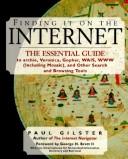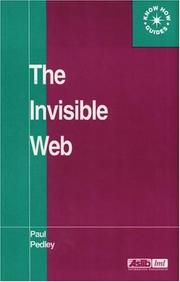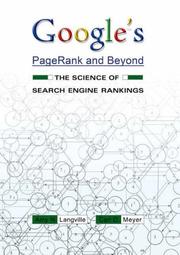| Listing 1 - 10 of 14 | << page >> |
Sort by
|

ISBN: 0471038571 9780471038573 Publisher: New York: Wiley,
Abstract | Keywords | Export | Availability | Bookmark
 Loading...
Loading...Choose an application
- Reference Manager
- EndNote
- RefWorks (Direct export to RefWorks)
Computer architecture. Operating systems --- DARPA Internet --- Internet --- Internet (Computer network) --- Internet (Computernetwerk) --- Internet (Réseau d'ordinateurs) --- Internet searching. --- Web search engines. --- Recherche sur Internet --- Moteurs de recherche sur Internet --- Internet searching --- Web search engines --- 002:62 --- Web searching --- World Wide Web searching --- Search engines --- Web portals --- World Wide Web --- Searching the Internet --- Electronic information resource searching --- 002:62 Informatietechnologie --- Informatietechnologie --- Subject access --- Recherche sur internet --- Moteurs de recherche sur internet --- Recherche sur Internet. --- Moteurs de recherche sur Internet.

ISBN: 0851424619 Year: 2001 Publisher: London Aslib-IMI
Abstract | Keywords | Export | Availability | Bookmark
 Loading...
Loading...Choose an application
- Reference Manager
- EndNote
- RefWorks (Direct export to RefWorks)
Internet. --- Information Storage and Retrieval. --- Internet searching --- Web search engines --- Web sites --- Recherche sur Internet --- Moteurs de recherche sur Internet --- Sites Web --- Directories --- Répertoires --- #A0410A --- Répertoires
Book
ISBN: 9782915825053 291582505X Year: 2009 Publisher: Caen: C&F éditions,
Abstract | Keywords | Export | Availability | Bookmark
 Loading...
Loading...Choose an application
- Reference Manager
- EndNote
- RefWorks (Direct export to RefWorks)
Des chercheurs en sciences de l'information et de la communication proposent une analyse du moteur de recherche Google qu'ils comparent à un entonnoir. Ils décodent les projections mentales de cette société pour mieux en éprouver les mythes et les limites en analysant sa stratégie et testant ses nouveaux services à travers l'abondante littérature qui lui est consacrée.
Internet searching --- Web search engines --- Recherche sur Internet --- Moteurs de recherche sur Internet --- Social aspects --- Aspect social --- Google --- Internet --- Information Science --- Web search engines. --- Google. --- Moteur de recherche
Multi
ISBN: 9781780631790 1780631790 9781843344742 1843344742 1843344734 9781843344735 Year: 2009 Publisher: Oxford Chandos Pub
Abstract | Keywords | Export | Availability | Bookmark
 Loading...
Loading...Choose an application
- Reference Manager
- EndNote
- RefWorks (Direct export to RefWorks)
The quest to achieve high website rankings in search engine results is a prominent subject for both academics and website owners/coders. Website Visibility marries academic research results to the world of the information practitioner and contains a focused look at the elements which contribute to website visibility, providing support for the application of each element with relevant research. A series of real-world case studies with tested examples of research on website visibility elements and their effect on rankings are reviewed.Written by a well-respected academic and prac
Web search engines. --- Web sites --- Design. --- Ratings and rankings. --- Design --- Ratings and rankings --- Moteurs de recherche sur Internet --- Sites Web --- Conception --- Classement
Book
ISBN: 9781479833641 1479833649 9781479866762 1479866768 9781479849949 1479849944 9781479837243 1479837245 Year: 2018 Publisher: New York: New York University press,
Abstract | Keywords | Export | Availability | Bookmark
 Loading...
Loading...Choose an application
- Reference Manager
- EndNote
- RefWorks (Direct export to RefWorks)
A revealing look at how negative biases against women of color are embedded in search engine results and algorithms Run a Google search for "black girls"-what will you find? "Big Booty" and other sexually explicit terms are likely to come up as top search terms. But, if you type in "white girls," the results are radically different. The suggested porn sites and un-moderated discussions about "why black women are so sassy" or "why black women are so angry" presents a disturbing portrait of black womanhood in modern society. In Algorithms of Oppression, Safiya Umoja Noble challenges the idea that search engines like Google offer an equal playing field for all forms of ideas, identities, and activities. Data discrimination is a real social problem; Noble argues that the combination of private interests in promoting certain sites, along with the monopoly status of a relatively small number of Internet search engines, leads to a biased set of search algorithms that privilege whiteness and discriminate against people of color, specifically women of color. Through an analysis of textual and media searches as well as extensive research on paid online advertising, Noble exposes a culture of racism and sexism in the way discoverability is created online. As search engines and their related companies grow in importance-operating as a source for email, a major vehicle for primary and secondary school learning, and beyond-understanding and reversing these disquieting trends and discriminatory practices is of utmost importance.
Search engines --- Discrimination. --- Google. --- Moteurs de recherche --- Sociological aspects. --- Sociologie. --- Information retrieval --- Sociology of minorities --- Algorithmus. --- COMPUTERS / Web. --- Diskriminierung. --- SOCIAL SCIENCE / Discrimination & Race Relations. --- Suchmaschine. --- Algorithme --- Racisme --- Sociologie de la communication --- Identité ethnique --- Discrimination --- Racism

ISBN: 9781400830329 9780691152660 9780691122021 0691122024 0691152667 140083032X Year: 2012 Publisher: Princeton (N.J.): Princeton university press,
Abstract | Keywords | Export | Availability | Bookmark
 Loading...
Loading...Choose an application
- Reference Manager
- EndNote
- RefWorks (Direct export to RefWorks)
Mathematics --- Web search engines --- Internet programming --- Moteurs de recherche sur Internet --- Programmation sur Internet --- Computer science. --- Informatique --- Bases de donnees --- Information systems --- IR (information retrieval) --- zoekmachines --- beoordeling --- Web search engines. --- Web sites --- Internet searching --- World Wide Web
Book
ISBN: 9781843344735 9781843344742 1843344734 1843344742 1780631790 9781780631790 Year: 2009 Publisher: Oxford Chandos
Abstract | Keywords | Export | Availability | Bookmark
 Loading...
Loading...Choose an application
- Reference Manager
- EndNote
- RefWorks (Direct export to RefWorks)
The quest to achieve high website rankings in search engine results is a prominent subject for both academics and website owners/coders. Website Visibility marries academic research results to the world of the information practitioner and contains a focused look at the elements which contribute to website visibility, providing support for the application of each element with relevant research. A series of real-world case studies with tested examples of research on website visibility elements and their effect on rankings are reviewed.Written by a well-respected academic and prac
002:62 --- 002:62 Informatietechnologie --- Informatietechnologie --- Web search engines. --- Web sites --- Moteurs de recherche sur Internet --- Sites Web --- Design. --- Ratings and rankings. --- Conception --- Classement --- Rankings of Web sites --- Ratings of Web sites --- Web site development --- Microformats --- Web searching --- World Wide Web searching --- Internet searching --- Search engines --- Web portals --- World Wide Web --- Rankings --- Ratings --- Authorship --- Subject access --- Design --- Ratings and rankings
Book
ISBN: 9781555709235 1555709230 9781555709716 1555709710 Year: 2014 Publisher: Chicago, Ill. Neal-Schuman
Abstract | Keywords | Export | Availability | Bookmark
 Loading...
Loading...Choose an application
- Reference Manager
- EndNote
- RefWorks (Direct export to RefWorks)
Google can't answer all your patron's questions-- but knowing some of these search secrets can help you help them. Google services and features are constantly evolving, and this guide introduces how web results are presented; how search filters can narrow your results; and how the Alerts service works.
Web search engines. --- Web applications --- Database searching. --- Moteurs de recherche sur Internet --- Applications Web --- Bases de données --- Interrogation --- Google. --- Web applications. --- 004.659 --- google --- zoekstrategieën --- Applications, Web --- Applications, Web-based --- Web-based applications --- Weblications --- Information retrieval --- Computer architecture. Operating systems --- Database searching --- Web search engines --- Data base searching --- Database search strategies --- Search strategies in databases --- Searching databases --- Electronic information resource searching --- Web searching --- World Wide Web searching --- Internet searching --- Search engines --- Web portals --- World Wide Web --- Application software --- zoekmachines --- Subject access --- BackRub

ISBN: 9786612096716 1282096710 0262256878 1423796586 9780262256872 0262182424 9780262182423 9780262681643 0262681641 6612096713 9781282096714 9781423796589 Year: 2004 Publisher: Cambridge, Mass. MIT Press
Abstract | Keywords | Export | Availability | Bookmark
 Loading...
Loading...Choose an application
- Reference Manager
- EndNote
- RefWorks (Direct export to RefWorks)
Does the information on the Web offer many alternative accounts of reality, or does it subtly align with an official version? In Information Politics on the Web, Richard Rogers identifies the cultures, techniques, and devices that rank and recommend information on the Web, analyzing not only the political content of Web sites but the politics built into the Web's infrastructure. Addressing the larger question of what the Web is for, Rogers argues that the Web is still the best arena for unsettling the official and challenging the familiar.Rogers describes the politics at work on the Web as either back-end--the politics of search engine technology--or front-end--the diversity, inclusivity, and relative prominence of sites publicly accessible on the Web. To analyze this, he developed four "political instruments," or software tools that gather information about the Web by capturing dynamic linking practices, attention cycles for issues, and changing political party commitments. On the basis of his findings on how information politics works, Rogers argues that the Web should be, and can be, a "collision space" for official and unofficial accounts of reality. (One chapter, "The Viagra Files" offers an entertaining analysis of official and unofficial claims for the health benefits of Viagra.) The distinctiveness of the Web as a medium lies partly in the peculiar practices that grant different statuses to information sources. The tools developed by Rogers capture these practices and contribute to the development of a new information politics that takes into account and draws from the competition between the official, the non-governmental, and the underground.
Information technology --- Web search engines --- Web portals --- Civil society. --- Knowledge, Sociology of. --- Social aspects. --- Political aspects. --- Knowledge, Theory of (Sociology) --- Sociology of knowledge --- Gateways (Web portals) --- Internet portals --- Portals (World Wide Web) --- Web searching --- World Wide Web searching --- Communication --- Knowledge, Theory of --- Public opinion --- Sociology --- Social epistemology --- Social contract --- Web sites --- Federated searching --- Internet searching --- Search engines --- World Wide Web --- Subject access --- Selective dissemination of information. --- Technologie de l'information --- Moteurs de recherche sur Internet --- Portails (Informatique) --- Diffusion sélective de l'information --- Sociologie de la connaissance --- Aspect social --- Aspect politique --- INFORMATION SCIENCE/Internet Studies --- INFORMATION SCIENCE/Technology & Policy
Multi
ISSN: 2052210X ISBN: 9781843346777 9781780633176 1780633173 184334677X Publisher: Oxford ; New Hampshire Chandos Publishing
Abstract | Keywords | Export | Availability | Bookmark
 Loading...
Loading...Choose an application
- Reference Manager
- EndNote
- RefWorks (Direct export to RefWorks)
Many libraries and museums have adapted to the current information climate, working with Google, Facebook, Twitter and iTunes to deliver information for their users. Many have not. Google This! describes the variety of free or nearly free options for social media, and shows how libraries are adapting, from the Library of Congress to small public libraries. The author presents conversations with social media innovators to show how their experience can create success for your institution's library. Chapters cover important aspects of social media for libraries including: how they relate to the i
Library management --- Library automation --- Mass communications --- Computer architecture. Operating systems --- sociale media --- bibliotheekmanagement --- marketing --- bibliotheken --- Online social networks --- Social media. --- Library materials --- Digitalization of library materials --- Digitization of library materials --- User-generated media --- Communication --- User-generated content --- Library applications. --- Digitization. --- Google. --- BackRub --- Searching, Bibliographical --- Web search engines --- Recherche documentaire --- Moteurs de recherche sur Internet --- Handbooks, manuals, etc. --- Handbooks, manuals, etc --- Guides, manuels, etc. --- Guides, manuels, etc --- Social media --- Library applications --- Digitization --- E-books --- 025.4.036 --- 025:681.3 --- 09 <08> --- 09 <08> Handschriften. Oude en merkwaardige drukken. Curiosa--Verzamelwerken. Reeksen--Boekwetenschap. Sociale aspecten van het boek. Boek en media. Toekomst van het boek --- Handschriften. Oude en merkwaardige drukken. Curiosa--Verzamelwerken. Reeksen--Boekwetenschap. Sociale aspecten van het boek. Boek en media. Toekomst van het boek --- 025:681.3 Bibliotheekautomatisering --- Bibliotheekautomatisering --- Computer aided search. Online searching. Zoeken op internet
| Listing 1 - 10 of 14 | << page >> |
Sort by
|

 Search
Search Feedback
Feedback About UniCat
About UniCat  Help
Help News
News